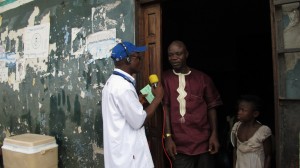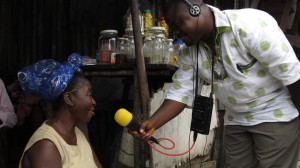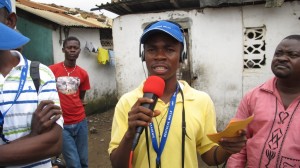Elections in Liberia and the role of journalists
On October 11, 2011, Liberia will hold its second democratic presidential and parliamentary elections since the end of the 1989-2003 civil war. Guest blogger Julia Bayer examines the role of journalists and the state of press freedom in Liberia.
Ranked 84 on Reporters Without Borders’ Press Freedom Index, Liberia has a long road ahead towards improving press freedom. However, the conditions for journalists working today have improved compared to those under the regime of Charles Taylor.
Though there are risks, the job of a journalist in Liberia is not as dangerous as it once was. Alongside many international media organizations there are three national organizations working to improve press freedom, to monitor and protect the rights of journalists and to assist their professional development.
These include the Press Union of Liberia, Liberian Media Center and the Center for Media Studies and Peace Building .
Nonetheless, says Malcolm Joseph, Executive Director of Center for Media Studies & Peace-Building (CEMESP), journalists are still subjected to violence.
“In today’s journalism there are no beating and killing of journalists. However, cases like brutality from the police, attacks from government officials are still taking place in today’s journalism in Liberia.”
CEMESP documents attacks on journalists and publishes a yearly report.
Media landscape – the importance of radio
Due to the high rate of illiteracy, radio represents the most important media in the country, and it reaches a large proportion of the population. Television and newspapers are expensive to produce and have a limited range. Besides the state broadcaster LBS, and its shortwave service ELBC, there are only three independent radio stations that broadcast nationwide – Star Radio, Radio Veritas and UNMIL Radio.
STAR radio is based in the capital Monrovia but since 2010 has been off air following staff industrial disputes. Radio Veritas is a catholic radio station and UNMIL Radio is a station run by the UN peacekeeping mission and is expected to be disbanded after the 2011 elections.
There are also a number community radio stations, that play a very important role in the democratization process because they reach people in local areas and can give voice to the otherwise voiceless.
Facing challenges in a post-conflict country
 As a post-conflict country, Liberia faces more challenges than others on the way to becoming a peaceful democratic state. Along with press freedom and the working conditions of journalists, there’re the questions of media regulations and a future public service broadcaster.
As a post-conflict country, Liberia faces more challenges than others on the way to becoming a peaceful democratic state. Along with press freedom and the working conditions of journalists, there’re the questions of media regulations and a future public service broadcaster.
Two draft media laws are still before parliament that would pave the way for an independent broadcasting regulator and to transform the state broadcaster into a public-service broadcaster.
Across the media sector there is also a chronic lack of modern equipment, funding and mobility – all of which are obstacles to accomplishing balanced and professional journalism.
These are some of the big challenges that journalists in Liberia are facing right now says Peter Quaqua, President of the Press Union of Liberia, especially reporting in a responsible, ethical and professional manner (check out the interview with DW-Akademie’s Barbara Gruber in a recent blog post).
Then there’s the problem of trust in the media. It’s not uncommon for Liberians to refuse to offer relevant information to the media for fear they might get into trouble. Moreover in rural areas, a lot of people do not speak English making it difficult for them to access news and information.
What’s the role of journalists?
As Liberia undergoes a social transformation, journalists and a free media play an important role for democracy.
The questions for the country to consider are what happens when journalists as watchdogs of democratic institutions ask the tough questions of government and politicians – something that is essential for transparency. Is that destabilising? Or, does negative or critical reporting of government lead to growing distrust of decision-makers and in turn cause new conflicts?
On the other hand, a watchdog body is needed to accurately reflect and report on the business of governing and the needs of the people.
Executive director of the Liberian Media Centre, Lawrence Randall, describes a dilemma for the journalist: “So there are two ways. We agree that we need to be more exposing of corruption. But also we have the responsibility to make sure that we equally help the government in meeting some of these development objectives, for instance the Poverty Reduction Strategy. When people come from conflict, expectations are so high. People want roads to be built, people want hospitals to be built, and people want schools to be built. And if you are reporting about massive corruption you have to be careful because that could inflame public tension.”
Differences between city and community journalism
Malcolm Joseph of the CEMESP sees the general task of a journalist in Liberia in the following way: “The role of the media or journalism is to gather and disseminate information to the public in a balanced manner. Balanced journalism is there to ensure that the public is educated and informed about issues that have to do with their lives. Most importantly, as Liberia is a post-conflict country. In this regard, journalism in Liberia today has the responsibility of making sure that the people are educated about things that bring them together, things that promote development and broadcast information and programmes that help to solidify the nation’s peace-building efforts.”
But working journalists in Liberia also have different ideas of their role depending on the expectations of their employer, their audiences, as well as their own individual experiences as a journalist.
For example, some journalists who work for community radio stations often refer to themselves partners of the government, assisting the government in the implementation of the Poverty Reduction Strategy in order to secure peace and promote the development of the country.
Or another role is one of a sort of development worker, who wants to educate their audience and help them help themselves. “We try to make them investigate and look more into things so as to avoid misinterpretation and misinformation. Because they lack the ability to verify information, they usually pass the wrong judgments or do the wrong thing,” says Justin Cole, a journalist working for a community radio in Bomi County.
Community journalists also see the importance of reporting the needs of people so that the government becomes aware and is able to specifically address those needs or problems. In this way the community also has a means of actively participating in the development process.
Journalists working in Monrovia may see themselves more as monitors for both the public and the government, in order to help prevent conflict.
Julius Kanubah, a journalist from Star Radio and correspondent for Deutsche Welle says: “We need conflict-solutions and reconciliation at this present moment in our society more than any time. So the media is now serving as a fourth estate to solve these disputes. The government is always reflected as to what measures it is taking to promote and sustain the interests of the society. We see ourselves as people responsible to both the government and the general public.”
Journalists who work for a station that is supported by international development partners are more likely to express criticism in public, and their willingness to express themselves freely is probably greater than that of a journalist working for a local media outlet. It is therefore particularly important that the international community continues participating in the peaceful reconstruction of the country and its media sector.
In the lead up to the elections there are many international media development agencies working in Liberia to improve the skills of journalists and the quality of journalism they produce.
Post-elections, it will be essential that both Liberian media organisations, together with international media development partners, reflect on the effectiveness of journalism training and co-operation, particularly on election reporting, and continue to support Liberian journalists in a meaningful way.
Julia Bayer is currently doing a one year professional placement at Deutsche Welle. She recently completed her tertiary studies with a Master’s thesis examining Liberian media and democratisation.
Photo credits: Stefanie Duckstein
1 Comment






Objectivity and things like such by logan.rine - Pearltrees | Monday 2011-12-12
[…] » Elections in Liberia and the role of journalists – Guest blog post – Africa – DW-WORLD.DE “In today’s journalism there are no beating and killing of journalists. However, cases like brutality from the police, attacks from government officials are still taking place in today’s journalism in Liberia.” CEMESP documents attacks on journalists and publishes a yearly report . […]